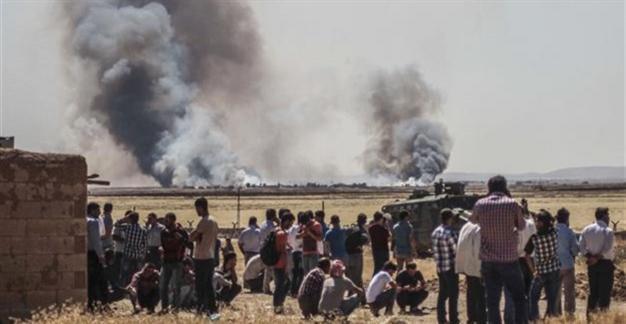ISIL launches second attack on Syria's Kobane, kills dozens
KOBANE / ŞANLIURFA

AA photo
A group of Islamic State of Iraq and the Levant (ISIL) militants has stormed into Kobane, the Kurdish-dominated Syrian town near the Turkish border which they failed to capture at the start of 2015 after four months of deadly clashes, in a new bid to fight back a Kurdish advance.Ankara has strongly denied all claims that ISIL militants, who supported the latest raid with at least one car bomb attack, sneaked into the city from Turkey.
Figures on causalities after the June 25 ISIL attack varied according to sources, but at least 20 people reportedly died in the attacks, while dozens more were injured.
After losses to the Kurds backed by U.S.-led air strikes, ISIL sought to retake the initiative with incursions into the Kurdish-held town of Kobane and government-held areas of the Haseki city in the northeast.
The attacks by ISIL follow a rapid advance by Kurdish-led forces deep into the hardline group’s territory, to within 50 kilometers of its de facto capital Raqqa.
Kobane was the site of one of the biggest battles against ISIL last year, during which tens of people died in street unrest launched in a number of Turkish cities on Oct. 6 and 7, 2014, calling on the government to be more active to not let the town fall to ISIL.
Deputy Prime Minister Numan Kurtulmuş categorically denied reports that the militants entered Kobane from the Turkish border, recalling last October’s deadly protests while criticizing fresh calls for demonstrations as “provocations.”
The Democratic Regions Party (DBP), a Kurdish-issue focused party, had called on citizens to form “human shield” for Kobane.
Speaking to reporters, Kurtulmuş said he “called on everyone to act responsibly.”
“By using the latest attack in Kobane as a pretext, some dirty circles are attempting to put Turkey on the target board. As they have long been doing, they are trying to make Turkey the subject of a smear campaign. Black propaganda has been launched claiming that Daesh militants who exploded the bomb in Kobane today crossed from the Turkish border. This is a total lie and slander,” he had said earlier in the day, using the Arabic acronym for ISIL.
Most of the people wounded in the attack came to Turkey, Kurtulmuş also said.
Turkey’s Foreign Ministry spokesperson Tanju Bilgiç also described the claims as “lies.”
Bilgiç also told reporters that 63 wounded people had been brought to Turkey after the attack and that two of them, one a child, had subsequently died. Kurtulmuş similarly underlined that Turkey had “immediately” accepted wounded people from Kobane, who were currently being treated at hospitals.
Prime Minister Ahmet Davutoğlu held separate scheduled meetings with Chief of General Staff Necdet Özel and National Intelligence Organization (MİT) head Haükan Fidan on June 25. Both meetings were convened in the aftermath of the latest events in Kobane.
Figen Yuksekdağ, the co-leader of the Kurdish issue-focused Peoples’ Democratic Party (HDP), claimed that Ankara had “supported ISIL for years. Today’s massacre is a part of this support.” The HDP entered parliament for the first time after clearing a 10 percent threshold in the June 7 election.
Redur Xelil, a spokesman for the Kurdish People’s Defense Units (YPG) in Syria, said the June 25 attackers entered the town from the west in five cars, deceptively flying the flag of the Western-backed Free Syrian Army (FSA) movement, which has fought alongside the YPG against ISIL.
“They opened fire randomly on everyone they found,” he told Reuters.
The Syrian Observatory for Human Rights stated that the attackers also wore YPG uniforms. Pictures posted on social media showed at least one dead man in uniform who was said to be an ISIL fighter.
An YPG Facebook page claimed that at least 15 ISIL fighters had been killed in Kobane.
In a separate offensive in the multi-sided Syrian civil war, an alliance of rebels in the south of the country also launched an attack with the aim of driving government forces from the city of Deraa.
The dual assaults on government forces in Hasaka and Deraa - both provincial capitals - are seen as a test of Bashir al-Assad’s resolve to hold out in remote outposts beyond his stronghold in the western parts of Syria.
















